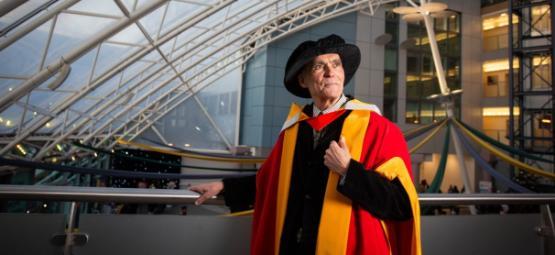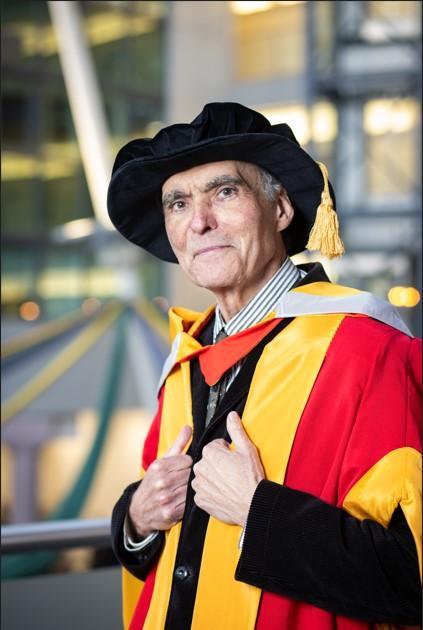“Bradford is a magical city for me” says director, producer and writer David Wilkinson
Renowned director, producer and writer David Wilkinson keeps returning to Bradford, a city he describes as “like no other.”

This week, David Wilkinson was awarded an honorary doctorate by the University of Bradford in recognition of his significant contributions to supporting and promoting cinematic arts both in Bradford and internationally.

Born in Leeds, David grew up in Horsforth and nearly gave up on education when the bureaucracy of the school systems meant he wasn’t given a fair shot at applying for Aireborough Grammar School. He was given an automatic fail, purely due to Leeds City Council’s refusal to share his work results from primary school, which were required at the time as part of the Thorne scheme – a means of allocating grammar school places in place of the 11 Plus exam. Reflecting on this, David recalls the frustration and anger he felt for many years at facing an unlevel educational playing field.
David spent much of his childhood in Bradford and holds fond memories of the city, which he has returned to throughout his life.
An exciting journey to the stage began at age 14 during David’s paper round, when he was spotted by a milkman who had invested in a Bradford-based modelling agency. “He saw me one day and said: ‘Lad, you’ve got a great face. Have you ever done any modelling?’ I didn’t even know what he meant!” David remembers.
Although not usually motivated by money, he was pleased to take on the extra work, modelling for catalogues and earning far more than his paper round for a few hours’ work. This led to a successful audition for a television commercial shot in Bradford and sparked his interest in acting.
David joined the Yeadon Amateur Dramatic and Operatic Society, playing small parts in their productions. Through an agent in Leeds, he auditioned for the influential West End producer Binkie Beaumont for the lead in the play The Winslow Boy. During this time, David made his first connection with Bradford Playhouse, where he was assessed on his elocution and suitability to play a boy from a middle-class and public school background.
Making appearances in over 40 theatre, TV and film productions, David acted successfully for over 10 years.
He then moved on to pursue producing and directing. He became the first independent producer to work with the BBC in 1982, producing ‘To the Lighthouse’ with Kenneth Branagh, which was nominated for a BAFTA. In 2015, David debuted as a director with his documentary The First Film, filmed in Bradford and Leeds.
His main motivation is to uncover the truth, whether demystifying the story of the first film, exploring the fate of war criminals involved in the Holocaust, or arguing for the return of the Parthenon Marbles to Greece. “All my films are educational,” David says.
David also moved into film distribution, choosing to champion British and Irish films. He has also hosted almost 500 Q&As and film panel events in the UK and internationally, and appeared on BBC Radio 4’s today programme as an expert on the British film industry.
The city of Bradford continues to inspire David. When asked to become a patron of the Bradford Film Festival in 2003, he eagerly accepted. This role helped him stay connected to the North and involved convincing famous friends to accept lifetime achievement awards. He was noted as the most proactive patron, securing films, filmmakers, speakers, and organising events.
“There is so much potential in Bradford,” he says, citing it as a brilliant place to set up a business.
David’s links with the University of Bradford go back many years. He has been part of an advisory panel and given talks to staff and students on subjects such as the transition to online platforms for films. He praises the university for its forward-thinking approach.
David’s advice for today’s graduates is to “never stop learning.” He believes that learning doesn’t stop when we leave school and encourages everyone to hold on to that ability.
